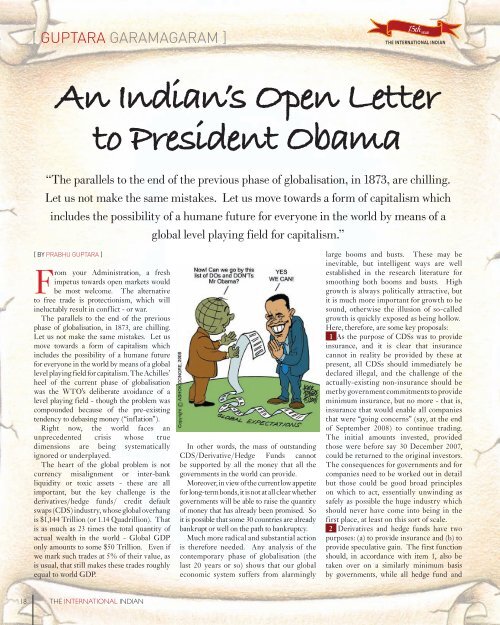THE INTERNATIONAL - International Indian
THE INTERNATIONAL - International Indian
THE INTERNATIONAL - International Indian
You also want an ePaper? Increase the reach of your titles
YUMPU automatically turns print PDFs into web optimized ePapers that Google loves.
[ GuPtara GaraMaGaraM ]<br />
An <strong>Indian</strong>’s Open Letter<br />
to President Obama<br />
“The parallels to the end of the previous phase of globalisation, in 1873, are chilling.<br />
Let us not make the same mistakes. Let us move towards a form of capitalism which<br />
includes the possibility of a humane future for everyone in the world by means of a<br />
global level playing field for capitalism.”<br />
[ By Prabhu GuPtara ]<br />
F<br />
rom your Administration, a fresh<br />
impetus towards open markets would<br />
be most welcome. The alternative<br />
to free trade is protectionism, which will<br />
ineluctably result in conflict - or war.<br />
The parallels to the end of the previous<br />
phase of globalisation, in 1873, are chilling.<br />
Let us not make the same mistakes. Let us<br />
move towards a form of capitalism which<br />
includes the possibility of a humane future<br />
for everyone in the world by means of a global<br />
level playing field for capitalism. The Achilles’<br />
heel of the current phase of globalisation<br />
was the WTO’s deliberate avoidance of a<br />
level playing field - though the problem was<br />
compounded because of the pre-existing<br />
tendency to debasing money (“inflation”).<br />
Right now, the world faces an<br />
unprecedented crisis whose true<br />
dimensions are being systematically<br />
ignored or underplayed.<br />
The heart of the global problem is not<br />
currency misalignment or inter-bank<br />
liquidity or toxic assets - these are all<br />
important, but the key challenge is the<br />
derivatives/hedge funds/ credit default<br />
swaps (CDS) industry, whose global overhang<br />
is $1,144 Trillion (or 1.14 Quadrillion). That<br />
is as much as 23 times the total quantity of<br />
actual wealth in the world - Global GDP<br />
only amounts to some $50 Trillion. Even if<br />
we mark such trades at 5% of their value, as<br />
is usual, that still makes these trades roughly<br />
equal to world GDP.<br />
In other words, the mass of outstanding<br />
CDS/Derivative/Hedge Funds cannot<br />
be supported by all the money that all the<br />
governments in the world can provide.<br />
Moreover, in view of the current low appetite<br />
for long-term bonds, it is not at all clear whether<br />
governments will be able to raise the quantity<br />
of money that has already been promised. So<br />
it is possible that some 30 countries are already<br />
bankrupt or well on the path to bankruptcy.<br />
Much more radical and substantial action<br />
is therefore needed. Any analysis of the<br />
contemporary phase of globalisation (the<br />
last 20 years or so) shows that our global<br />
economic system suffers from alarmingly<br />
large booms and busts. These may be<br />
inevitable, but intelligent ways are well<br />
established in the research literature for<br />
smoothing both booms and busts. High<br />
growth is always politically attractive, but<br />
it is much more important for growth to be<br />
sound, otherwise the illusion of so-called<br />
growth is quickly exposed as being hollow.<br />
Here, therefore, are some key proposals:<br />
1. 1 As the purpose of CDSs was to provide<br />
insurance, and it is clear that insurance<br />
cannot in reality be provided by these at<br />
present, all CDSs should immediately be<br />
declared illegal, and the challenge of the<br />
actually-existing non-insurance should be<br />
met by government commitments to provide<br />
minimum insurance, but no more - that is,<br />
insurance that would enable all companies<br />
that were “going concerns” (say, at the end<br />
of September 2008) to continue trading.<br />
The initial amounts invested, provided<br />
those were before say 30 December 2007,<br />
could be returned to the original investors.<br />
The consequences for governments and for<br />
companies need to be worked out in detail<br />
but those could be good broad principles<br />
on which to act, essentially unwinding as<br />
safely as possible the huge industry which<br />
should never have come into being in the<br />
first place, at least on this sort of scale.<br />
2. 2 Derivatives and hedge funds have two<br />
purposes: (a) to provide insurance and (b) to<br />
provide speculative gain. The first function<br />
should, in accordance with item 1, also be<br />
taken over on a similarly minimum basis<br />
by governments, while all hedge fund and<br />
18<br />
<strong>THE</strong> <strong>INTERNATIONAL</strong> INDIAN
















